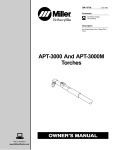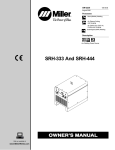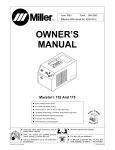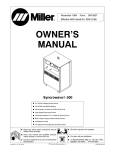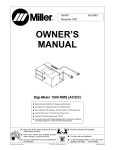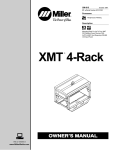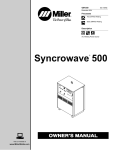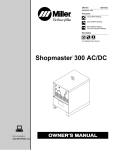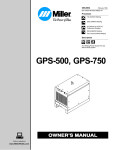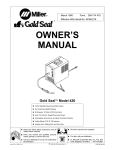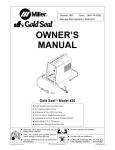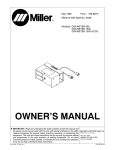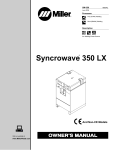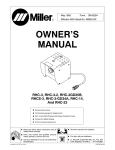Download Miller Electric 333 Owner`s manual
Transcript
June 1998 Form: OM-230M Effective With Serial No. KJ027 371 OWNER’S MANUAL SRH-333 And SRH-444 CC/DC Welding Power Source For SMAW, SAW Welding And CAC-A Cutting And Gouging 300 Amperes, 32 Volts DC At 60% Duty Cycle 400 Amperes, 36 Volts DC At 60% Duty Cycle Uses Three-Phase Input Power High And Low Range Weld Output Terminals Control Circuit Overload Protection Remote Amperage Control Receptacle And Switch Read and follow these instructions and all safety blocks carefully. Give this manual to the operator. Have only trained and qualified persons install, operate, or service this unit. For help, call your distributor Call your distributor if you do not understand the directions. or: MILLER Electric Mfg. Co., P.O. Box 1079, Appleton, WI 54912 920-735-4505 cover 5/94 – ST-139 445-B 1995 MILLER Electric Mfg. Co. PRINTED IN USA From Miller to You Thank you and congratulations on choosing Miller. Now you can get the job done and get it done right. We know you don’t have time to do it any other way. That’s why when Niels Miller first started building arc welders in 1929, he made sure his products offered long-lasting value and superior quality. Like you, his customers couldn’t afford anything less. Miller products had to be more than the best they could be. They had to be the best you could buy. Today, the people that build and sell Miller products continue the tradition. They’re just as committed to providing equipment and service that meets the high standards of quality and value established in 1929. This Owner’s Manual is designed to help you get the most out of your Miller products. Please take time to read the Safety precautions. They will help you protect yourself against potential hazards on the worksite. We’ve made installation and operation quick and easy. With Miller you can count on years of reliable service with proper maintenance. And if for some reason the unit needs repair, there’s a Troubleshooting section that will help you Miller is the first welding figure out what the problem is. The parts list equipment manufacturer in will then help you to decide which exact part the U.S.A. to be registered to the ISO 9001 Quality System you may need to fix the problem. Warranty and Standard. service information for your particular model are also provided. Miller Electric manufactures a full line of welders and welding related equipment. For information on other quality Miller products, contact your local Miller distributor to receive the latest full line catalog or individual catalog sheets. To locate your nearest distributor or service agency call 1-800-4-A-Miller, or visit us at www.MillerWelds.com on the web. Working as hard as you do – every power source from Miller is backed by the most hassle-free warranty in the business. Miller offers a Technical Manual which provides more detailed service and parts information for your unit. To obtain a Technical Manual, contact your local distributor. Your distributor can also supply you with Welding Process Manuals such as SMAW, GTAW, GMAW, and GMAW-P. EMF INFORMATION NOTE Considerations About Welding And The Effects Of Low Frequency Electric And Magnetic Fields The following is a quotation from the General Conclusions Section of the U.S. Congress, Office of Technology Assessment, Biological Effects of Power Frequency Electric & Magnetic Fields – Background Paper, OTA-BP-E-53 (Washington, DC: U.S. Government Printing Office, May 1989): “. . . there is now a very large volume of scientific findings based on experiments at the cellular level and from studies with animals and people which clearly establish that low frequency magnetic fields can interact with, and produce changes in, biological systems. While most of this work is of very high quality, the results are complex. Current scientific understanding does not yet allow us to interpret the evidence in a single coherent framework. Even more frustrating, it does not yet allow us to draw definite conclusions about questions of possible risk or to offer clear science-based advice on strategies to minimize or avoid potential risks.” To reduce magnetic fields in the workplace, use the following procedures: 1. Keep cables close together by twisting or taping them. 2. Arrange cables to one side and away from the operator. 3. Do not coil or drape cables around the body. 4. Keep welding power source and cables as far away as practical. 5. Connect work clamp to workpiece as close to the weld as possible. About Pacemakers: The above procedures are among those also normally recommended for pacemaker wearers. Consult your doctor for complete information. mod10.1 4/93 TABLE OF CONTENTS SECTION 1 – SAFETY INFORMATION . . . . . . . . . . . . . . . . . . . . . . . . . . . . . . . . . . . . . . . . . . . . . . . . . . . . 1 SECTION 2 – SPECIFICATIONS . . . . . . . . . . . . . . . . . . . . . . . . . . . . . . . . . . . . . . . . . . . . . . . . . . . . . . . . . . 2-1. Volt-Ampere Curves . . . . . . . . . . . . . . . . . . . . . . . . . . . . . . . . . . . . . . . . . . . . . . . . . . . . . . . . . . . . 2-2. Duty Cycle . . . . . . . . . . . . . . . . . . . . . . . . . . . . . . . . . . . . . . . . . . . . . . . . . . . . . . . . . . . . . . . . . . . . 1 2 2 SECTION 3-1. 3-2. 3-3. 3-4. 3-5. 3 – INSTALLATION . . . . . . . . . . . . . . . . . . . . . . . . . . . . . . . . . . . . . . . . . . . . . . . . . . . . . . . . . . . . Selecting A Location And Moving Welding Power Source . . . . . . . . . . . . . . . . . . . . . . . . . . . . Selecting And Preparing Weld Output Cables . . . . . . . . . . . . . . . . . . . . . . . . . . . . . . . . . . . . . . Connecting To Weld Output Terminals . . . . . . . . . . . . . . . . . . . . . . . . . . . . . . . . . . . . . . . . . . . . Remote Amperage Control Receptacle . . . . . . . . . . . . . . . . . . . . . . . . . . . . . . . . . . . . . . . . . . . Connecting Input Power . . . . . . . . . . . . . . . . . . . . . . . . . . . . . . . . . . . . . . . . . . . . . . . . . . . . . . . . 3 3 4 5 6 6 SECTION 4 – OPERATION . . . . . . . . . . . . . . . . . . . . . . . . . . . . . . . . . . . . . . . . . . . . . . . . . . . . . . . . . . . . . . . 8 SECTION 5 – MAINTENANCE & TROUBLESHOOTING . . . . . . . . . . . . . . . . . . . . . . . . . . . . . . . . . . . . . 12 5-1. 5-2. 5-3. Routine Maintenance . . . . . . . . . . . . . . . . . . . . . . . . . . . . . . . . . . . . . . . . . . . . . . . . . . . . . . . . . . . Overload Protection . . . . . . . . . . . . . . . . . . . . . . . . . . . . . . . . . . . . . . . . . . . . . . . . . . . . . . . . . . . . Troubleshooting . . . . . . . . . . . . . . . . . . . . . . . . . . . . . . . . . . . . . . . . . . . . . . . . . . . . . . . . . . . . . . . 12 12 13 SECTION 6 – ELECTRICAL DIAGRAMS . . . . . . . . . . . . . . . . . . . . . . . . . . . . . . . . . . . . . . . . . . . . . . . . . . . 14 SECTION 7 – PARTS LIST . . . . . . . . . . . . . . . . . . . . . . . . . . . . . . . . . . . . . . . . . . . . . . . . . . . . . . . . . . . . . . . Figure 7-1. Main Assembly . . . . . . . . . . . . . . . . . . . . . . . . . . . . . . . . . . . . . . . . . . . . . . . . . . . . . . . . . . . . Parts For Optional Equipment . . . . . . . . . . . . . . . . . . . . . . . . . . . . . . . . . . . . . . . . . . . . . . . . . . . . . . . . . . Figure 7-2. Panel, Front w/Components . . . . . . . . . . . . . . . . . . . . . . . . . . . . . . . . . . . . . . . . . . . . . . . . . Figure 7-3. Terminal, Pri . . . . . . . . . . . . . . . . . . . . . . . . . . . . . . . . . . . . . . . . . . . . . . . . . . . . . . . . . . . . . . . Figure 7-4. Panel, Rear w/Components . . . . . . . . . . . . . . . . . . . . . . . . . . . . . . . . . . . . . . . . . . . . . . . . . Figure 7-5. Transformer & Amplifier, Power Main . . . . . . . . . . . . . . . . . . . . . . . . . . . . . . . . . . . . . . . . . 16 16 17 18 19 19 20 OM-230M 6/98 ARC WELDING SAFETY PRECAUTIONS WARNING ARC WELDING can be hazardous. PROTECT YOURSELF AND OTHERS FROM POSSIBLE SERIOUS INJURY OR DEATH. KEEP CHILDREN AWAY. PACEMAKER WEARERS KEEP AWAY UNTIL CONSULTING YOUR DOCTOR. In welding, as in most jobs, exposure to certain hazards occurs. Welding is safe when precautions are taken. The safety information given below is only a summary of the more complete safety information that will be found in the Safety Standards listed on the next page. Read and follow all Safety Standards. HAVE ALL INSTALLATION, OPERATION, MAINTENANCE, AND REPAIR WORK PERFORMED ONLY BY QUALIFIED PEOPLE. in disconnect box or that cord plug is connected to a properly grounded receptacle outlet. ELECTRIC SHOCK can kill. Touching live electrical parts can cause fatal shocks or severe burns. The electrode and work circuit is electrically live whenever the output is on. The input power circuit and machine internal circuits are also live when power is on. In semiautomatic or automatic wire welding, the wire, wire reel, drive roll housing, and all metal parts touching the welding wire are electrically live. Incorrectly installed or improperly grounded equipment is a hazard. 1. Do not touch live electrical parts. 2. Wear dry, hole-free insulating gloves and body protection. 3. Insulate yourself from work and ground using dry insulating mats or covers big enough to prevent any physical contact with the work or ground. 4. Disconnect input power or stop engine before installing or servicing this equipment. Lockout/tagout input power according to OSHA 29 CFR 1910.147 (see Safety Standards). 5. Properly install and ground this equipment according to its Owner’s Manual and national, state, and local codes. 6. Always verify the supply ground – check and be sure that input power cord ground wire is properly connected to ground terminal ARC RAYS can burn eyes and skin; NOISE can damage hearing; FLYING SLAG OR SPARKS can injure eyes. Arc rays from the welding process produce intense visible and invisible (ultraviolet and infrared) rays that can burn eyes and skin. Noise from some processes can damage hearing. Chipping, grinding, and welds cooling throw off pieces of metal or slag. NOISE 1. Use approved ear plugs or ear muffs if noise level is high. FUMES AND GASES can be hazardous to your health. Welding produces fumes and gases. Breathing these fumes and gases can be hazardous to your health. 1. Keep your head out of the fumes. Do not breathe the fumes. 2. If inside, ventilate the area and/or use exhaust at the arc to remove welding fumes and gases. 3. If ventilation is poor, use an approved air-supplied respirator. 4. Read the Material Safety Data Sheets (MSDSs) and the manufacturer’s instruction for metals, consumables, coatings, cleaners, and degreasers. CYLINDERS can explode if damaged. Shielding gas cylinders contain gas under high pressure. If damaged, a cylinder can explode. Since gas cylinders are normally part of the welding process, be sure to treat them carefully. 1. Protect compressed gas cylinders from excessive heat, mechanical shocks, slag, open flames, sparks, and arcs. 2. Install cylinders in an upright position by securing to a stationary support or cylinder rack to prevent falling or tipping. 3. Keep cylinders away from any welding or other electrical circuits. 7. When making input connections, attach proper grounding conductor first – double-check connections. 8. Frequently inspect input power cord for damage or bare wiring – replace cord immediately if damaged – bare wiring can kill. 9. Turn off all equipment when not in use. 10. Do not use worn, damaged, undersized, or poorly spliced cables. 11. Do not drape cables over your body. 12. If earth grounding of the workpiece is required, ground it directly with a separate cable – do not use work clamp or work cable. 13. Do not touch electrode if you are in contact with the work, ground, or another electrode from a different machine. 14. Use only well-maintained equipment. Repair or replace damaged parts at once. Maintain unit according to manual. 15. Wear a safety harness if working above floor level. 16. Keep all panels and covers securely in place. 17. Clamp work cable with good metal-to-metal contact to workpiece or worktable as near the weld as practical. ARC RAYS 2. Wear a welding helmet fitted with a proper shade of filter to protect your face and eyes when welding or watching (see ANSI Z49.1 and Z87.1 listed in Safety Standards). 3. Wear approved safety glasses with side shields. 4. Use protective screens or barriers to protect others from flash and glare; warn others not to watch the arc. 5. Wear protective clothing made from durable, flame-resistant material (wool and leather) and foot protection. 5. Work in a confined space only if it is well ventilated, or while wearing an air-supplied respirator. Always have a trained watchperson nearby. Welding fumes and gases can displace air and lower the oxygen level causing injury or death. Be sure the breathing air is safe. 6. Do not weld in locations near degreasing, cleaning, or spraying operations. The heat and rays of the arc can react with vapors to form highly toxic and irritating gases. 7. Do not weld on coated metals, such as galvanized, lead, or cadmium plated steel, unless the coating is removed from the weld area, the area is well ventilated, and if necessary, while wearing an air-supplied respirator. The coatings and any metals containing these elements can give off toxic fumes if welded. 4. 5. 6. 7. Never drape a welding torch over a gas cylinder. Never allow a welding electrode to touch any cylinder. Never weld on a pressurized cylinder – explosion will result. Use only correct shielding gas cylinders, regulators, hoses, and fittings designed for the specific application; maintain them and associated parts in good condition. 8. Turn face away from valve outlet when opening cylinder valve. 9. Keep protective cap in place over valve except when cylinder is in use or connected for use. 10. Read and follow instructions on compressed gas cylinders, associated equipment, and CGA publication P-1 listed in Safety Standards. sr1.1.1 2/94 WELDING can cause fire or explosion. Welding on closed containers, such as tanks, drums, or pipes, can cause them to blow up. Sparks can fly off from the welding arc. The flying sparks, hot workpiece, and hot equipment can cause fires and burns. Accidental contact of electrode to metal objects can cause sparks, explosion, overheating, or fire. Check and be sure the area is safe before doing any welding. 1. Protect yourself and others from flying sparks and hot metal. 2. Do not weld where flying sparks can strike flammable material. 3. Remove all flammables within 35 ft (10.7 m) of the welding arc. If this is not possible, tightly cover them with approved covers. 4. Be alert that welding sparks and hot materials from welding can easily go through small cracks and openings to adjacent areas. 5. Watch for fire, and keep a fire extinguisher nearby. WARNING 6. Be aware that welding on a ceiling, floor, bulkhead, or partition can cause fire on the hidden side. 7. Do not weld on closed containers such as tanks, drums, or pipes, unless they are properly prepared according to AWS F4.1 (see Safety Standards). 8. Connect work cable to the work as close to the welding area as practical to prevent welding current from traveling long, possibly unknown paths and causing electric shock and fire hazards. 9. Do not use welder to thaw frozen pipes. 10. Remove stick electrode from holder or cut off welding wire at contact tip when not in use. 11. Wear oil-free protective garments such as leather gloves, heavy shirt, cuffless trousers, high shoes, and a cap. 12. Remove any combustibles, such as a butane lighter or matches, from your person before doing any welding. ENGINES can be hazardous. ENGINE EXHAUST GASES can kill. 1. Use equipment outside in open, well-ventilated areas. Engines produce harmful exhaust gases. 2. If used in a closed area, vent engine exhaust outside and away from any building air intakes. ENGINE FUEL can cause fire or explosion. 3. Do not overfill tank – allow room for fuel to expand. 4. Do not spill fuel. If fuel is spilled, clean up before starting engine. Engine fuel is highly flammable. 1. Stop engine and let it cool off before checking or adding fuel. 2. Do not add fuel while smoking or if unit is near any sparks or open flames. MOVING PARTS can cause injury. Moving parts, such as fans, rotors, and belts can cut fingers and hands and catch loose clothing. 1. Keep all doors, panels, covers, and guards closed and securely in place. 2. Stop engine before installing or connecting unit. SPARKS can cause BATTERY GASES TO EXPLODE; BATTERY ACID can burn eyes and skin. Batteries contain acid and generate explosive gases. STEAM AND PRESSURIZED HOT COOLANT can burn face, eyes, and skin. It is best to check coolant level when engine is cold to avoid scalding. 3. Have only qualified people remove guards or covers for maintenance and troubleshooting as necessary. 4. To prevent accidental starting during servicing, disconnect negative (–) battery cable from battery. 5. Keep hands, hair, loose clothing, and tools away from moving parts. 6. Reinstall panels or guards and close doors when servicing is finished and before starting engine. 1. Always wear a face shield when working on a battery. 2. Stop engine before disconnecting or connecting battery cables. 3. Do not allow tools to cause sparks when working on a battery. 4. Do not use welder to charge batteries or jump start vehicles. 5. Observe correct polarity (+ and –) on batteries. 1. If the engine is warm and checking is needed, follow steps 2 and 3. 2. Wear safety glasses and gloves and put a rag over cap. 3. Turn cap slightly and let pressure escape slowly before completely removing cap. PRINCIPAL SAFETY STANDARDS Safety in Welding and Cutting, ANSI Standard Z49.1, from American Welding Society, 550 N.W. LeJeune Rd, Miami FL 33126 Safety and Health Standards, OSHA 29 CFR 1910, from Superintendent of Documents, U.S. Government Printing Office, Washington, D.C. 20402. Recommended Safe Practices for the Preparation for Welding and Cutting of Containers That Have Held Hazardous Substances, American Welding Society Standard AWS F4.1, from American Welding Society, 550 N.W. LeJeune Rd, Miami, FL 33126 National Electrical Code, NFPA Standard 70, from National Fire Protection Association, Batterymarch Park, Quincy, MA 02269. sr1.1.1 2/94 Safe Handling of Compressed Gases in Cylinders, CGA Pamphlet P-1, from Compressed Gas Association, 1235 Jefferson Davis Highway, Suite 501, Arlington, VA 22202. Code for Safety in Welding and Cutting, CSA Standard W117.2, from Canadian Standards Association, Standards Sales, 178 Rexdale Boulevard, Rexdale, Ontario, Canada M9W 1R3. Safe Practices For Occupation And Educational Eye And Face Protection, ANSI Standard Z87.1, from American National Standards Institute, 1430 Broadway, New York, NY 10018. Cutting And Welding Processes, NFPA Standard 51B, from National Fire Protection Association, Batterymarch Park, Quincy, MA 02269. SECTION 1 – SAFETY INFORMATION mod1.1 2/93 Read all safety messages throughout this manual. Obey all safety messages to avoid injury. Learn the meaning of WARNING and CAUTION. 1 2 2 WARNING ELECTRIC SHOCK can kill. • Do not touch live electrical parts. • Disconnect input power before MOVING PARTS can injure. • Keep away from moving parts. • Keep all panels and covers closed 4 installing or servicing. Safety Alert Symbol 2 Signal Word WARNING means possible death or serious injury can happen. CAUTION 3 1 when operating. CAUTION means possible minor injury or equipment damage can happen. 3 Statement Of Hazard And Result 4 Safety Instructions To Avoid Hazard 5 Hazard Symbol (If Available) 6 Safety Banner 5 READ SAFETY BLOCKS at start of Section 3-1 before proceeding. WARNING 6 Read safety blocks for each symbol shown. 7 7 NOTE Turn Off switch when using high frequency. NOTE Special instructions for best operation – not related to safety. Figure 1-1. Safety Information SECTION 2 – SPECIFICATIONS Table 2-1. Welding Power Source Specification Description Type Of Output Constant Current/Direct Current (CC/DC) Welding Processes Shielded Metal Arc (SMAW) And Submerged Arc (SAW) Welding; Air Carbon Arc Cutting And Gouging (CAC-A) Overall Dimensions See Figure 3-2 Options See Rear Cover 300 Ampere 400 Ampere Rated Weld Output 300 Amperes, 32 Volts DC At 60% Duty Cycle 400 Amperes, 36 Volts DC At 60% Duty Cycle Type Of Input Power Three-Phase, 208, 230, Or 460 Volts AC; 60 Hz Three-Phase, 208, 230, 460, Or 575 Volts AC; 60 Hz Input Amperes At Rated Output 64 A At 208 V, 58 A At 230 V, 29 A At 460 V 89 A At 208 V, 80 A At 230 V, 40 A At 460 V, 32 A At 575 V Input Amperes While Idling 4.8 A At 208 V, 4.3 A At 230 V, 2.15 A At 460 V 5.8 A At 208 V, 5.3 A At 230 V, 2.6 A At 460 V, 2.1 A At 575 V KVA/KW Used At Rated Output 23.1 kVA/15 kW 31.9 kVA/19.6 kW KVA/KW Used While Idling 1.7 kVA/0.8 kW 2.1 kVA/0.8 kW Welding Range In Amperes A (Low): 30-225; B (High): 40-375 A (Low): 30-280; B (High): 50-500 Max. Open-Circuit Voltage 75 Volts DC 75 Volts DC Weight Net: 705 lb (320 kg); Ship: 730 lb (331 kg) Net: 775 lb (352 kg); Ship: 800 lb (363 kg) OM-230 Page 1 2-1. Volt-Ampere Curves The volt-ampere curves show the minimum and maximum voltage and amperage output capabilities of the welding power source. Curves of other settings fall between the curves shown. A. 300 Ampere Model B. 400 Ampere Model ssb1.1 10/91 – SB-144 522-A / SB-144 521-A Figure 2-1. Volt-Ampere Curves 2-2. Duty Cycle CAUTION WELDING LONGER THAN RATED DUTY CYCLE can damage unit and void warranty. • Do not weld at rated load longer than shown below. warn7.1 8/93 Chart Definition 0 10 Duty Cycle is percentage of 10 minutes that unit can weld at rated load without overheating. Minutes 60% Duty Cycle At 300 Amperes For 300 Ampere Models 60% Duty Cycle At 400 Amperes For 400 Ampere Models 6 Minutes Welding 4 Minutes Resting sb1.2 8/93 – SB-144 523 Figure 2-2. Duty Cycle OM-230 Page 2 SECTION 3 – INSTALLATION 3-1. Selecting A Location And Moving Welding Power Source WARNING ELECTRIC SHOCK can kill. • • FUMES can be hazardous; LACK OF F RESH AI R AND PRO PER VENTILATION can be harmful. Do not touch live electrical parts. Disconnect input power conductors from deenergized supply line BEFORE moving welding power source. • • FIRE OR EXPLOSION can result from placing unit on, over, or near combustible surfaces. • Do not breathe welding fumes. Place unit only where there is a good fresh air supply and proper ventilation. Do not locate unit on, over, or near combustible surfaces. Do not install unit near flammables. FAL L I NG EQ UI PM ENT can cau se serious personal injury and equipment damage. BLOCKED AIRFLOW causes overheating and possible damage to unit. Use lifting eye to lift unit only, NOT running gear, gas cylinders, or any other accessories. Use equipment of adequate capacity to lift the unit. • • • • • Do not block airflow. Use only factory-approved filter. Warranty is void if any unapproved filter is used. swarn11.1 12/94 Movement 1 Lifting Eye 2 Lifting Forks Use lifting eye or lifting forks to move unit. 1 If using lifting forks, extend forks beyond opposite side of unit. 3 OR Rating Label Use rating label to determine input power needs. 4 2 Line Disconnect Device Locate unit near correct input power supply. Location And Airflow 4 3 18 in (460 mm) Special installation may be required where gasoline or volatile liquids are present – see NEC Article 511 or CEC Section 20. 18 in (460 mm) ssb9.1 5/94 – ST-800 402 / ST-139 445-B Figure 3-1. Movement And Location Of Welding Power Source OM-230 Page 3 A G H B C F E Inches Millimeters A 30-1/4 768 B 22-1/2 571 C 35-3/4 908 D 20 508 E 1-1/4 32 F 1-1/2 38 G 4-1/2 114 H 29-3/4 755 J 1/2 Dia 6 Holes 13 Dia 6 Holes D J ST-800 039 Figure 3-2. Overall Dimensions And Base Mounting Hole Layout 3-2. Selecting And Preparing Weld Output Cables 1 Weld Output Cable Determine total cable length in weld circuit and maximum welding amperes. Use Table 3-1 to select proper cable size. Use shortest cables possible. Do not use damaged cables. 2 Terminal Lug Use lugs of proper amperage capacity and hole size for connecting to work clamp, electrode holder, and weld output terminals. 3 2 2 Insulated Electrode Holder Install according to manufacturer’s instructions. 3 4 1 Work Clamp Install onto work cable. 10 ft (3 m) 4 For Example, Total Cable Length In Weld Circuit = 20 ft (6 m) 10 ft (3 m) Tools Needed: sb6.1 11/92 – S-0653 Figure 3-3. Selecting And Preparing Weld Output Cables OM-230 Page 4 Table 3-1. Weld Cable Size* Total Cable (Copper) Length In Weld Circuit Not Exceeding 100 ft (30 m) Or Less Welding Amperes 10 To 60% Duty Cycle 60 Thru 100% Duty Cycle 100 150 200 250 300 350 400 500 600 4 3 3 2 1 1/0 1/0 2/0 3/0 4 3 2 1 1/0 2/0 2/0 3/0 4/0 150 ft (45 m) 200 ft (60 m) 250 ft (70 m) 300 ft (90 m) 350 ft (105 m) 400 ft (120 m) 1/0 3/0 4/0 2-2/0 2-3/0 2-3/0 2-4/0 3-3/0 3-4/0 1/0 3/0 4/0 2-2/0 2-3/0 2-4/0 2-4/0 3-3/0 3-4/0 10 Thru 100% Duty Cycle 4 2 1 1/0 2/0 3/0 3/0 4/0 2-2/0 3 1 1/0 2/0 3/0 4/0 4/0 2-2/0 2-3/0 2 1/0 2/0 3/0 4/0 2-2/0 2-2/0 2-3/0 2-4/0 1 2/0 3/0 4/0 2-2/0 2-3/0 2-3/0 2-4/0 3-3/0 *Weld cable size (AWG) is based on either a 4 volts or less drop or a current density of at least 300 circular mils per ampere. S-0007-D 3-3. Connecting To Weld Output Terminals WARNING ELECTRIC SHOCK can kill. • • Do not touch live electrical parts. Turn Off welding power source, and disconnect input power before making any weld output connections. swarn12.1 2/93 1 2 3 1 Positive (+) Weld Output Terminal 2 A Negative (–) Weld Output Terminal (Low Range) 3 B Negative (–) Weld Output Terminal (High Range) For DC Electrode Positive (DCEP), connect work cable to negative (–) terminal that supplies desired amperage range. Connect electrode holder cable to positive (+) terminal. For DC Electrode Negative (DCEN), reverse cable connections. Use ONLY one negative weld output terminal at a time. Tools Needed: 3/4 in Ref. ST-800 040-A Figure 3-4. Weld Output Connections OM-230 Page 5 3-4. Remote Amperage Control Receptacle 2 1 Remote Amperage Control Receptacle RC1 2 Keyway To connect remote amperage control to receptacle, insert plug and turn clockwise until tight. 1 Ref. ST-800 040-A Figure 3-5. Remote Amperage Control Receptacle 3-5. Connecting Input Power WARNING ELECTRIC SHOCK can kill. • • • • Do not touch live electrical parts. Turn Off welding power source, and disconnect input power before inspecting or installing. Have only qualified persons install unit. Installation must meet National Electrical Code and all other codes. swarn3.1 2/93 A. Positioning Jumper Links Jumper links allow operation on different input voltages and are factory set for the highest input voltage. Tools Needed: 3/8 in Check input voltage available at site. Open rear panel access door to check jumper links. 1 Input Voltage Label – Only One Is On Unit Look at jumper links and compare link position with unit label. 2 2 Input Voltage Jumper Links Move links to match input voltage. For example, use 230 volts position when 230 volts input power is available. Close door or go on to Figure 3-7. 208 VOLTS L1 L2 L3 230 VOLTS 460 VOLTS L1 L1 L2 L3 L2 L3 S-011 406-B 1 230 VOLTS 460 VOLTS 575 VOLTS L 1 L 1 L 1 L 2 L 3 L 2 L 3 L 2 L 3 S-021 154-A ssb5.1 2/92 – Ref. ST-800 042 Figure 3-6. Input Voltage Jumper Links Location OM-230 Page 6 B. Connecting Input Power Have only qualified persons make this installation. Open rear panel access door. 1 2 Input Conductors 3 Grounding Conductor Select size and length using Table 3-2. Conductor rating must comply with national, state, and local electrical codes. Use lugs of proper amperage capacity and correct hole size. 1 9 4 8 Line Disconnect Device Of Proper Rating 4 3 Strain Relief Connector Insert conductors through strain relief. 5 Input Terminal Board 6 Line Terminals 7 Welding Power Source Ground Terminal Connect grounding conductor to ground terminal first. Then connect input conductors to line terminals. 8 Disconnect Device Ground Terminal Install and connect grounding conductor and input conductors in conduit or equivalent to deenergized line disconnect device. Connect grounding conductor first, then line input conductors. Be sure grounding conductor goes to an earth ground. 5 Close rear panel door. 9 Overcurrent Protection Select type and size using Table 3-2. Install into deenergized line disconnect device (fused disconnect switch shown). 3 2 7 6 Tools Needed: 3/8, 7/16, 1/2 in ssb2.4 1/94 – ST-800 042 Figure 3-7. Input Power Connections Table 3-2. Electrical Service Guide 300 Amp 400 Amp Input Voltage 208 230 460 208 230 460 575 Input Amperes At Rated Output 64 58 29 89 80 40 32 Max Recommended Standard Fuse Or Circuit Breaker Rating In Amperes 100 90 45 125 125 60 50 8 8 10 4 6 8 10 88 (27) 107 (33) 288 (88) 148 (45) 123 (37) 325 (99) 342 (104) 8 8 10 6 6 10 10 Min Input Conductor Size In AWG/Kcmil Max Recommended Input Conductor Length In Feet (Meters) Min Grounding Conductor Size In AWG/Kcmil Reference: 1993 National Electrical Code (NEC). S-0092J OM-230 Page 7 SECTION 4 – OPERATION WARNING ELECTRIC SHOCK can kill. • • • • ARC RAYS can burn eyes and skin; NOISE can damage hearing. Always wear dry insulating gloves. Insulate yourself from work and ground. Do not touch live electrical parts. Keep all panels and covers securely in place. • • MOVING PARTS can cause injury. FUMES AND GASES can be hazardous to your health. • • • • • Keep your head out of the fumes. Ventilate area, or use breathing device. Read Material Safety Data Sheets (MSDSs) and manufacturer’s instructions for material used. • • Do not weld near flammable material. Watch for fire; keep extinguisher nearby. Do not locate unit over combustible surfaces. Do not weld on closed containers. Allow work and equipment to cool before handling. 4 3 Keep away from moving parts. Keep all doors, panels, covers, and guards closed and securely in place. MAGNETIC FIELDS FROM HIGH CURRENTS can affect pacemaker operation. WELDING can cause fire or explosion. • • • • • Wear welding helmet with correct shade of filter. Wear correct eye, ear, and body protection. Pacemaker wearers keep away. Wearers should consult their doctor before going near arc welding, gouging, or spot welding operations. See Safety Precautions at beginning of manual for basic welding safety information. swarn6.1 10/91 2 5 1 6 1 Power Switch 2 Pilot Light (Optional) 3 Amperage Adjustment Control 4 Remote Amperage Control Receptacle (See Section 3-4) 5 Remote Amperage Switch 6 Circuit Breaker CB1 (See Section 5-2) ST-800 040-A Figure 4-1. Controls OM-230 Page 8 Wear the following while welding: 1 2 3 1 Dry, Insulating Gloves 2 Safety Glasses With Side Shields 3 Welding Helmet With Correct Shade Of Filter (See ANSI Z49.1) sb3.1 1/94 Figure 4-2. Safety Equipment 1 Work Clamp Connect work clamp to a clean, paint-free location on workpiece, as close to weld area as possible. 1 Use wire brush or sandpaper to clean metal at weld joint area. Use chipping hammer to remove slag after welding. Tools Needed: sb4.1 2/93 Figure 4-3. Work Clamp 1 Amperage Adjustment Control Use control to adjust amperage within range for Negative Weld Output terminal (see Section 3-3). Use A (inner) scale for low amperage range and B (outer) scale for high amperage range. 1 400 Ampere Model Shown Ref. ST-174 170 Figure 4-4. Amperage Adjustment Control OM-230 Page 9 CAUTION ARCING can damage switch. • Do not change Remote Amperage switch position while power is on. Arcing inside switch can damage contacts, causing switch to fail. warn5.1* 2/93 1 Remote Amperage Switch Use switch to select way of controlling amperage adjustment. 1 For front panel control, place switch in the Off position. For remote control, place switch in On position (see Section 3-4). See example below. Example: Combination Remote Amperage Control – 400 Ampere Model Shown Set Switch 2 Remote Amperage Control Select Amperage Range In Example: Range Selected = 30 to 280 A DC Maximum Amperage Selected = 100 A DC Min = 30 A DC Max = 100 A DC 2 Max (100 A DC) Min (30 A DC) Select Maximum Amperage Adjust Remote Control S-0774 Figure 4-5. Remote Amperage Switch 1 2 Figure 4-6. Power Switch And Optional Pilot Light OM-230 Page 10 1 Power Switch 2 Pilot Light Use switch to turn unit and pilot light On and Off. 1 1 2 Ammeter Ammeter displays weld amperage output of unit. 2 Voltmeter Voltmeter displays voltage at the weld output terminals, but not necessarily the welding arc due to cable resistance, poor connections, etc. Figure 4-7. Ammeter And Voltmeter (Optional) Install & Connect Equipment Select Electrode Put On Personal Safety Equipment Set Controls Insert Electrode Into Holder Turn On Welding Power Source Begin Welding ssb7.1 9/92 Figure 4-8. Sequence Of Shielded Metal Arc Welding (SMAW) Install & Connect Equipment Connect Compressed Air Supply Turn On Compressed Air Supply Select Carbon Electrode Turn On Welding Power Source Put On Personal Safety Equipment Insert Electrode Into Torch Set Controls Begin Cutting Or Gouging Figure 4-9. Sequence Of Air Carbon Arc Cutting And Gouging (CAC-A) Install & Connect Equipment Install & Prepare Wire Feeding System Turn On Flux System Install &Prepare Flux System Put On Personal Safety Equipment Set Controls Turn On Feeder And Welding Power Source Begin Welding Figure 4-10. Sequence Of Submerged Arc Welding (SAW) OM-230 Page 11 SECTION 5 – MAINTENANCE & TROUBLESHOOTING WARNING ELECTRIC SHOCK can kill. • • MOVING PARTS can cause injury. • Do not touch live electrical parts. Keep away from moving parts. Turn Off welding power source, and disconnect input power before inspecting, maintaining, or servicing. HOT PARTS can cause severe burns. • Allow cooling period before maintaining or servicing. Maintenance to be performed only by qualified persons. swarn8.1 2/93 5-1. Routine Maintenance 3 Months Turn Off all power before maintaining. 6 Months Tape Or Replace Cracked Cables Blow Out Or Vacuum Inside OR During Heavy Service, Clean Monthly Replace Unreadable Labels Sealed Bearings – No Oil Needed Clean And Tighten Weld Terminals ST-139 445-B Figure 5-1. Maintenance Schedule 5-2. Overload Protection READ SAFETY BLOCKS at start of Section 5 before proceeding. WARNING 1 Circuit Breaker CB1 CB1 protects the welding power source control circuit from overload. If CB1 opens, weld output drops to the minimum of the range selected. Press button breaker. 1 to reset circuit Ref. ST-800 040-A Figure 5-2. Circuit Breaker CB1 OM-230 Page 12 5-3. Troubleshooting WARNING ELECTRIC SHOCK can kill. • • MOVING PARTS can cause injury. • Do not touch live electrical parts. Keep away from moving parts. Turn Off welding power source, and disconnect input power before inspecting, maintaining, or servicing. HOT PARTS can cause severe burns. • Allow cooling period before servicing. Troubleshooting to be performed only by qualified persons. swarn9.1 2/93 Table 5-1. Welding Trouble Trouble No weld output; unit completely inoperative. Remedy Place Power switch in the On position. Section Figure 4-6 Place line disconnect switch in the On position. 3-5B Check for open line fuse(s), and replace if necessary. Check and reset circuit breakers. 3-5B Check for proper input connections. 3-5B Check for proper jumper link positions. 3-5A No weld output; optional pilot light on. Clean and tighten all weld connections. 3-3 Low or minimum weld output. Check for proper line voltage. –– Check for open line fuse(s), and replace if necessary. Check and reset circuit breakers. Clean and tighten all weld connections. 3-5B 3-3 Place Remote Amperage switch in the correct position. Figure 4-5 Select correct size weld cables according to Table 3-1. 3-2 Low weld amperage; Amperage Adjustment control does not control amperage. Reset Circuit Breaker CB1, if necessary. 5-2 Maximum weld output. Have Factory Authorized Service Station/Service Distributor check Amperage Adjustment control. Erratic weld output. Check for proper input connections. Excessive line current or line fuses(s) open repeatedly. Fan motor inoperative and/or overheating. Figure 4-4 3-5B Clean and tighten weld cable connections. 3-3 Use proper size and type electrodes. –– Check for proper input connections. 3-5B Check for proper jumper link positions. 3-5A Replace fan motor if necessary. –– Check for fan blade obstruction. –– OM-230 Page 13 SECTION 6 – ELECTRICAL DIAGRAMS SB-143 314 Figure 6-1. Circuit Diagram For Welding Power Source OM-230 Page 14 NOTES OM-230 Page 15 Fig 7-3 Fig 7-2 2 13 3 4 5 6 7 Fig 7-5 8 9 12 10 Fig 7-4 11 SECTION 7 – PARTS LIST 1 ST-139 447-C OM-230 Page 16 Figure 7-1. Main Assembly Item No. Dia. Mkgs. Part No. Description Quantity Model 300 400 Amp Amp Figure 7-1. Main Assembly ... ... ... ... ... ... ... ... ... ... ... ... ... ... ... ... 1 2 2 3 3 4 5 6 7 8 9 10 11 11 12 13 . . . . . . . . . . . . . 006 016 . . . . . . . . . . . . . 006 890 . . . . . . . . . . . . . . 007 110 . . . SR1 . . . . . 173 671 . . . SR1 . . . . . 173 936 . . . SR2 . . . . . 035 704 . . . . R2 . . . . . 071 054 . . . . . . . . . . . . . 605 741 . MA1,T1 . . . . Fig 7-5 . . . . . . . . . . . . . 026 627 . . . . . . . . . . . . +116 888 . . . . . . . . . . . . . . Fig 7-4 . . . TE1 . . . . . 038 145 . . . TE1 . . . . . 038 138 . . . . . . . . . . . . . 191 758 . . . . . . . . . . . . . . Fig 7-2 .. .. .. .. .. .. .. .. .. .. .. .. .. .. .. .. PANEL, side . . . . . . . . . . . . . . . . . . . . . . . . . . . . . . . . . . . . . . . . . . . . . 2 . . . . COVER, top . . . . . . . . . . . . . . . . . . . . . . . . . . . . . . . . . . . . . . . . . . . . . 1 . . . . COVER, top (used w/meters) . . . . . . . . . . . . . . . . . . . . . . . . . . . . . . . . . . . . . RECTIFIER, si diode . . . . . . . . . . . . . . . . . . . . . . . . . . . . . . . . . . . . . 1 RECTIFIER, si diode . . . . . . . . . . . . . . . . . . . . . . . . . . . . . . . . . . . . . . . . . . . . RECTIFIER, integ 40A 800V . . . . . . . . . . . . . . . . . . . . . . . . . . . . . . . 1 . . . . RESISTOR, WW adj 50W 2 ohm . . . . . . . . . . . . . . . . . . . . . . . . . . . 1 . . . . CLIP, mtg resistor .312 ID core . . . . . . . . . . . . . . . . . . . . . . . . . . . . . 2 . . . . TRANSFORMER & AMPLIFIER, power main . . . . . . . . . . . . . . . . 1 . . . . GASKET, lifting eye . . . . . . . . . . . . . . . . . . . . . . . . . . . . . . . . . . . . . . . 1 . . . . GROMMET, rbr 1.500 ID x 1.750mtg hole . . . . . . . . . . . . . . . . . . . 2 . . . . PANEL, rear w/components . . . . . . . . . . . . . . . . . . . . . . . . . . . . . . . 1 . . . . TERMINAL, pri (dual voltage) (Fig 7-3) . . . . . . . . . . . . . . . . . . . . . . 1 . . . . TERMINAL, pri (triple voltage) (Fig 7-3) . . . . . . . . . . . . . . . . . . . . . 1 . . . . BASE . . . . . . . . . . . . . . . . . . . . . . . . . . . . . . . . . . . . . . . . . . . . . . . . . . . 1 . . . . PANEL, front w/components . . . . . . . . . . . . . . . . . . . . . . . . . . . . . . . 1 . . . . 2 1 1 1 1 1 2 1 1 2 1 1 1 1 1 Parts For Optional Equipment . . . . . . . . . . . . . . . . . . . 040 670 . . . . . . . . . PL1 . . . . . *027 638 . . . . . . . . . . . . . . . . . . . 027 628 . . . . . . . . . . . . . . . . . . . 027 631 . . . . . . . . . . . . . . . . . . . 041 818 . . . . . . . . . . . . . . . . . . . 041 824 . . . . . . . . . . A . . . . . . 025 608 . . . . . . . . . . A . . . . . . . 025 611 . . . . . . . . . . V . . . . . . 025 604 . . . . . . . . . . . . . . . . . . . 103 966 . . . . . . . . . . . . . . . . . . . 103 967 . . . . . . . . . . . . . . . . . . . 103 965 . . . . . . . . . . . . . . . . . . . 010 493 . . . . . . . . . . . . . . . . . . . 010 859 . . PILOT LIGHT, (consisting of) . . . . . . . . . . . . . . . . . . . . . . . . . . . . . . 1 . . . . . . . . BULB, incand slide base 48V . . . . . . . . . . . . . . . . . . . . . . . . . . . . . 1 . . . . . . . . LENS, light ind red clear . . . . . . . . . . . . . . . . . . . . . . . . . . . . . . . . . 1 . . . . . . . . HOUSING, light ind slide base 125V . . . . . . . . . . . . . . . . . . . . . . 1 . . . . . . METER KIT, (consisting of) . . . . . . . . . . . . . . . . . . . . . . . . . . . . . . . . 1 . . METER KIT, (consisting of) . . . . . . . . . . . . . . . . . . . . . . . . . . . . . . . . . . . . . . . . . . . METER, amp dc 50MV 0-500 scale . . . . . . . . . . . . . . . . . . . . . . . 1 . . . . METER, amp dc 50MV 0-600 scale . . . . . . . . . . . . . . . . . . . . . . . . . . . . . . . . . . METER, volt dc 0-100 scale . . . . . . . . . . . . . . . . . . . . . . . . . . . . . . 1 . . . . . . . . PANEL, front meter box . . . . . . . . . . . . . . . . . . . . . . . . . . . . . . . . . 1 . . . . . . . . PANEL, rear meter box . . . . . . . . . . . . . . . . . . . . . . . . . . . . . . . . . . 1 . . . . . . . . WRAPPER, meter box . . . . . . . . . . . . . . . . . . . . . . . . . . . . . . . . . . 1 . . . . . . . . BUSHING, snap-in .625 ID x .875mtg hole . . . . . . . . . . . . . . . . 1 . . . . . . . . CLAMP, hose .562-1.062clp dia . . . . . . . . . . . . . . . . . . . . . . . . . . 1 . . . . 1 1 1 1 1 1 1 1 1 1 1 1 +One grommet (center) is included with the Amplifier, Transformer, Stabilizer Assembly. *Recommended Spare Parts. BE SURE TO PROVIDE MODEL AND SERIAL NUMBER WHEN ORDERING REPLACEMENT PARTS. OM-230 Page 17 Item No. Dia. Mkgs. Part No. Description Quantity Figure 7-2. Panel, Front w/Components (Fig 7-1 Item 13) . . . 1 . . . . . . . . . +017 287 . . . . . . . . . . . . . . . . 134 327 . . . 2 . . . CB . . 083 432 . . . 3 . . . RC1 . . 039 607 . . . . . . . . . . . . . . . . 605 797 . . . 4 . . . . S2 . . 011 609 . . . 5 . . . . R1 . . 030 653 . . . 6 . . . . S1 . . 173 417 . . . 7 . . . . . . . . . . 039 047 . . . 7 . . . . . . . . . . 039 046 . . . 8 . . . . . . . . . . 601 879 . . . 9 . . . . . . . . . . 039 044 . . . 10 . . . . . . . . . . 601 880 . . . 11 . . . . . . . . . . 039 049 . . . 11 . . . . . . . . . . 039 045 . . . 12 . . . . . . . . . . 601 976 . . . 13 . . . . . . . . . . . . . . . . + . . . . . . . . . . . . . . . . 004 948 . . . 14 . . . . . . . . . . 097 926 . . PANEL, front . . . . . . . . . . . . . . . . . . . . . . . . . . . . . . . . . . . . . . . . . . . . . . . . . . . . . . . . LABEL, general precautionary . . . . . . . . . . . . . . . . . . . . . . . . . . . . . . . . . . . . . . . . . . CIRCUIT BREAKER, man reset 10A 250VDC . . . . . . . . . . . . . . . . . . . . . . . . . . . . RECEPTACLE, twlk 3P3W 20A 250V . . . . . . . . . . . . . . . . . . . . . . . . . . . . . . . . . . . . PLUG, twlk 3P3W 20A 125V Arrow Hart 6312 . . SWITCH, tgl SPDT 15A 125VAC . . . . . . . . . . . . . . . . . . . . . . . . . . . . . . . . . . . . . . . . RHEOSTAT, WW 150W 15 ohm . . . . . . . . . . . . . . . . . . . . . . . . . . . . . . . . . . . . . . . . SWITCH, rotary w/knob . . . . . . . . . . . . . . . . . . . . . . . . . . . . . . . . . . . . . . . . . . . . . . . . TERMINAL, pwr output red (consisting of) . . . . . . . . . . . . . . . . . . . . . . . . . . . . . . . . TERMINAL, pwr output black (consisting of) . . . . . . . . . . . . . . . . . . . . . . . . . . . . . . . . NUT, stl hex full fnsh .500-13 . . . . . . . . . . . . . . . . . . . . . . . . . . . . . . . . . . . . . . . . . . . BUS BAR . . . . . . . . . . . . . . . . . . . . . . . . . . . . . . . . . . . . . . . . . . . . . . . . . . . . . . . . . . . . NUT, stl hex jam .500-13 . . . . . . . . . . . . . . . . . . . . . . . . . . . . . . . . . . . . . . . . . . . . . . . TERMINAL BOARD, red . . . . . . . . . . . . . . . . . . . . . . . . . . . . . . . . . . . . . . . . . . . . . . . TERMINAL BOARD, black . . . . . . . . . . . . . . . . . . . . . . . . . . . . . . . . . . . . . . . . . . . . . SCREW, cap stl hexhd .500-13 x 1.500 . . . . . . . . . . . . . . . . . . . . . . . . . . . . . . . . NAMEPLATE, (order by model and serial number) . . . . . . . . . . . . . . . . . . . . . . . . LABEL, arc welding can be injurious . . . . . . . . . . . . . . . . . . . . . . . . . . . . . . . . . . . . . KNOB, pointer . . . . . . . . . . . . . . . . . . . . . . . . . . . . . . . . . . . . . . . . . . . . . . . . . . . . . . 1 1 1 1 1 1 1 1 2 1 1 1 1 1 1 1 1 1 2 3 6 1 4 5 8 7 9 10 11 12 7 14 6 13 ST-018 369-F Figure 7-2. Panel, Front w/Components +When ordering a component originally displaying a precautionary label, the label should also be ordered. BE SURE TO PROVIDE MODEL AND SERIAL NUMBER WHEN ORDERING REPLACEMENT PARTS. OM-230 Page 18 Item No. Part No. Description Quantity 038 145 Figure 7-3. Terminal, Pri (Fig 7-1 Item 11) ... ... ... ... ... ... ... ... 1 2 3 4 5 6 7 8 ..... ..... ..... ..... ..... ..... ..... ..... 601 835 038 058 038 887 010 913 038 618 601 836 010 915 038 888 . . NUT, brs hex 10-32reg . . . . . . . . . . . . . . . . . . . . . . . . . . . . . . . . . . . . . . . . . . . . . TERMINAL BOARD, pri . . . . . . . . . . . . . . . . . . . . . . . . . . . . . . . . . . . . . . . . . . . . STUD, pri bd brs 10-32 x 1.375 . . . . . . . . . . . . . . . . . . . . . . . . . . . . . . . . . . . . . . WASHER, flat brs .218 ID x .460 OD x .031thk . . . . . . . . . . . . . . . . . . . . . . . . LINK, jumper . . . . . . . . . . . . . . . . . . . . . . . . . . . . . . . . . . . . . . . . . . . . . . . . . . . . . . NUT, brs hex .250-20 jam hvy . . . . . . . . . . . . . . . . . . . . . . . . . . . . . . . . . . . . . . . WASHER, flat brs .250 ID x .625 OD x .031thk . . . . . . . . . . . . . . . . . . . . . . . . STUD, pri bd brs .250-20 x 1.500 . . . . . . . . . . . . . . . . . . . . . . . . . . . . . . . . . . . 038 138 24 . . . . 36 1 ...... 1 12 . . . . 18 12 . . . . 18 6 ...... 6 6 ...... 6 6 ...... 6 3 ...... 3 1 5 4 3 2 1 7 6 8 6 4 7 3 SA-138 574 Figure 7-3. Terminal, Pri 2 1 ST-018 370-C Figure 7-4. Panel, Rear w/Components Item No. Dia. Mkgs. Part No. Description Quantity Figure 7-4. Panel, Rear w/Components (Fig 7-1 Item 10) ... ... ... ... ... 1 2 3 3 4 . . . FM . . .......... .......... .......... .......... 116 190 131 361 032 604 032 611 018 144 .. .. .. .. .. MOTOR, fan 1/12hp 230V 1550RPM . . . . . . . . . . . . . . . . . . . . . . . . . . . . . . . . . . CHAMBER, plenum . . . . . . . . . . . . . . . . . . . . . . . . . . . . . . . . . . . . . . . . . . . . . . . . . BLADE, fan 14 in 3 wing 19deg 60Hz or . . . . . . . . . . . . . . . . . . . . . . . . . . . . . . . BLADE, fan 14 in 3 wing 25deg 50Hz . . . . . . . . . . . . . . . . . . . . . . . . . . . . . . . . . . PANEL, rear . . . . . . . . . . . . . . . . . . . . . . . . . . . . . . . . . . . . . . . . . . . . . . . . . . . . . . . . 1 1 1 1 1 BE SURE TO PROVIDE MODEL AND SERIAL NUMBER WHEN ORDERING REPLACEMENT PARTS. OM-230 Page 19 Replace Coils At Factory Or Authorized Service Stations/Service Distributors Item No. Dia. Mkgs. Part No. Quantity Model 300 400 Amp Amp Description Figure 7-5. Transformer & Amplifier, Power Main (Fig 7-1 Item 7) (Listed below as Amplifier) . . . . . . . MA1,T1 . . . . . . . . . . MA1,T1 . . . ... 1 .... Z ...... . . . 2 . . . PR1 . . . . . . . . 2 . . . PR1 . . . . . . . . 3 . . . PR1 . . . . . . . . 3 . . . PR1 . . . . . . . . 4 . . . SEC . . . . . ... 5 ............. . . . 6 . . CWD . . . . . . . . . . . MA1,T1 . . . . . . . . . . MA1,T1 . . . ... 1 .... Z ...... . . . 2 . . . PR1 . . . . . . . . 2 . . . PR1 . . . . . . . . 3 . . . PR1 . . . . . . . . 3 . . . PR1 . . . . . . . . 4 . . . SEC . . . . . ... 5 ............. . . . 6 . . CWD . . . . 093 896 093 895 036 126 093 524 093 522 093 523 093 521 071 009 018 873 033 652 093 929 093 930 036 127 093 583 093 585 093 584 093 586 033 801 018 873 033 262 . . AMPLIFIER, 208/230/460 (consisting of) . . . . . . . . . . . . . . . . . . . . 1 . . AMPLIFIER, 230/460/575 (consisting of) . . . . . . . . . . . . . . . . . . . . 1 . . . . STABILIZER . . . . . . . . . . . . . . . . . . . . . . . . . . . . . . . . . . . . . . . . . . . 1 . . . . COIL, pri LH 208/230/460 . . . . . . . . . . . . . . . . . . . . . . . . . . . . . . . . 1 . . . . COIL, pri LH 230/460/575 . . . . . . . . . . . . . . . . . . . . . . . . . . . . . . . . 1 . . . . COIL, pri center & RH 208/230/460 . . . . . . . . . . . . . . . . . . . . . . . 2 . . . . COIL, pri center & RH 230/460/575 . . . . . . . . . . . . . . . . . . . . . . . 2 . . . . COIL, sec . . . . . . . . . . . . . . . . . . . . . . . . . . . . . . . . . . . . . . . . . . . . . 3 . . . . BAFFLE, air . . . . . . . . . . . . . . . . . . . . . . . . . . . . . . . . . . . . . . . . . . . 1 . . . . COIL, control dc . . . . . . . . . . . . . . . . . . . . . . . . . . . . . . . . . . . . . . . . 1 . . AMPLIFIER 208/230/460 (consisting of) . . . . . . . . . . . . . . . . . . . . . . . . . . . . . . AMPLIFIER 230/460/575 (consisting of) . . . . . . . . . . . . . . . . . . . . . . . . . . . . . . . . STABILIZER . . . . . . . . . . . . . . . . . . . . . . . . . . . . . . . . . . . . . . . . . . . . . . . . . . . . . . COIL, pri LH 208/230/460 . . . . . . . . . . . . . . . . . . . . . . . . . . . . . . . . . . . . . . . . . . . COIL, pri LH 230/460/575 . . . . . . . . . . . . . . . . . . . . . . . . . . . . . . . . . . . . . . . . . . . COIL, pri center & RH 208/230/460 . . . . . . . . . . . . . . . . . . . . . . . . . . . . . . . . . . COIL, pri center & RH 230/460/575 . . . . . . . . . . . . . . . . . . . . . . . . . . . . . . . . . . COIL, sec . . . . . . . . . . . . . . . . . . . . . . . . . . . . . . . . . . . . . . . . . . . . . . . . . . . . . . . . BAFFLE, air . . . . . . . . . . . . . . . . . . . . . . . . . . . . . . . . . . . . . . . . . . . . . . . . . . . . . . COIL, control dc . . . . . . . . . . . . . . . . . . . . . . . . . . . . . . . . . . . . . . . . . . . . . . . 1 1 1 1 1 2 2 3 1 1 1 3 2 6 4 ST-036 200-D 5 Figure 7-5. Transformer & Amplifier, Power Main BE SURE TO PROVIDE MODEL AND SERIAL NUMBER WHEN ORDERING REPLACEMENT PARTS. OM-230 Page 20 OPTIONS AND ACCESSORIES RHC-3 REMOTE CONTROL (#040 056) Remote hand amperage control for all Gold Star SRH models. Supplied with a 20 ft. (6 m) cable and plug. #3-WA (#040 043) 35 ft (10.6 m) #1/0 electrode cable with electrode holder and lug attached, 30 ft. (9 m) #1/0 ground cable with lugs attached, welding helmet, wire scratch brush. (For Gold Star SRH-333). #4-WA (#040 045) 35 ft (10.6 m) #2/0 electrode cable with electrode holder and lug attached, 30 ft. (9 m) #2/0 ground cable with lugs attached, welding helmet, wire scratch brush. (For Gold Star SRH-444). NO. 20 RUNNING GEAR (#041 581) Four 8 in. (203 mm) poly/rubber blend wheels with 30 in. (762 mm) towing handle. 5/94 Effective January 1, 1998 (Equipment with a serial number preface of “KJ” or newer) This limited warranty supersedes all previous Miller warranties and is exclusive with no other guarantees or warranties expressed or implied. LIMITED WARRANTY – Subject to the terms and conditions below, Miller Electric Mfg. Co., Appleton, Wisconsin, warrants to its original retail purchaser that new Miller equipment sold after the effective date of this limited warranty is free of defects in material and workmanship at the time it is shipped by Miller. THIS WARRANTY IS EXPRESSLY IN LIEU OF ALL OTHER WARRANTIES, EXPRESS OR IMPLIED, INCLUDING THE WARRANTIES OF MERCHANTABILITY AND FITNESS. Within the warranty periods listed below, Miller will repair or replace any warranted parts or components that fail due to such defects in material or workmanship. Miller must be notified in writing within thirty (30) days of such defect or failure, at which time Miller will provide instructions on the warranty claim procedures to be followed. Miller shall honor warranty claims on warranted equipment listed below in the event of such a failure within the warranty time periods. All warranty time periods start on the date that the equipment was delivered to the original retail purchaser, or one year after the equipment is sent to a North American distributor or eighteen months after the equipment is sent to an International distributor. 1. 2. 5 Years Parts – 3 Years Labor * Original main power rectifiers * Inverters (input and output rectifiers only) 3 Years — Parts and Labor * 3. Transformer/Rectifier Power Sources * Plasma Arc Cutting Power Sources * Semi-Automatic and Automatic Wire Feeders * Inverter Power Supplies * Intellitig * Engine Driven Welding Generators (NOTE: Engines are warranted separately by the engine manufacturer.) 1 Year — Parts and Labor * Motor Driven Guns (w/exception of Spoolmate 185) * Process Controllers * Positioners and Controllers * Automatic Motion Devices * Robots * IHPS Power Sources * Water Coolant Systems * HF Units * Grids * Spot Welders * Load Banks * SDX Transformers * Miller Cyclomatic Equipment * Running Gear/Trailers * Plasma Cutting Torches (except APT, ZIPCUT & PLAZCUT Models) * Deutz Engines (outside North America) * Field Options (NOTE: Field options are covered under True Blue for the remaining warranty period of the product they are installed in, or for a minimum of one year — whichever is greater.) 4. 6 Months — Batteries 5. 90 Days — Parts and Labor * MIG Guns/TIG Torches * APT, ZIPCUT & PLAZCUT Model Plasma Cutting Torches * Remote Controls * Accessory Kits * Replacement Parts (No labor) * Spoolmate 185 Miller’s True Blue Limited Warranty shall not apply to: 1. Items furnished by Miller, but manufactured by others, such as engines or trade accessories. These items are covered by the manufacturer’s warranty, if any. 2. Consumable components; such as contact tips, cutting nozzles, contactors, brushes, slip rings, relays or parts that fail due to normal wear. 3. Equipment that has been modified by any party other than Miller, or equipment that has been improperly installed, improperly operated or misused based upon industry standards, or equipment which has not had reasonable and necessary maintenance, or equipment which has been used for operation outside of the specifications for the equipment. MILLER PRODUCTS ARE INTENDED FOR PURCHASE AND USE BY COMMERCIAL/INDUSTRIAL USERS AND PERSONS TRAINED AND EXPERIENCED IN THE USE AND MAINTENANCE OF WELDING EQUIPMENT. In the event of a warranty claim covered by this warranty, the exclusive remedies shall be, at Miller’s option: (1) repair; or (2) replacement; or, where authorized in writing by Miller in appropriate cases, (3) the reasonable cost of repair or replacement at an authorized Miller service station; or (4) payment of or credit for the purchase price (less reasonable depreciation based upon actual use) upon return of the goods at customer’s risk and expense. Miller’s option of repair or replacement will be F.O.B., Factory at Appleton, Wisconsin, or F.O.B. at a Miller authorized service facility as determined by Miller. Therefore no compensation or reimbursement for transportation costs of any kind will be allowed. TO THE EXTENT PERMITTED BY LAW, THE REMEDIES PROVIDED HEREIN ARE THE SOLE AND EXCLUSIVE REMEDIES. IN NO EVENT SHALL MILLER BE LIABLE FOR DIRECT, INDIRECT, SPECIAL, INCIDENTAL OR CONSEQUENTIAL DAMAGES (INCLUDING LOSS OF PROFIT), WHETHER BASED ON CONTRACT, TORT OR ANY OTHER LEGAL THEORY. Warranty Questions? Call 1-800-4-AMILLER for your local Miller distributor. ANY EXPRESS WARRANTY NOT PROVIDED HEREIN AND ANY IMPLIED WARRANTY, GUARANTY OR REPRESENTATION AS TO PERFORMANCE, AND ANY REMEDY FOR BREACH OF CONTRACT TORT OR ANY OTHER LEGAL THEORY WHICH, BUT FOR THIS PROVISION, MIGHT ARISE BY IMPLICATION, OPERATION OF LAW, CUSTOM OF TRADE OR COURSE OF DEALING, INCLUDING ANY IMPLIED WARRANTY OF MERCHANTABILITY OR FITNESS FOR PARTICULAR PURPOSE, WITH RESPECT TO ANY AND ALL EQUIPMENT FURNISHED BY MILLER IS EXCLUDED AND DISCLAIMED BY MILLER. Some states in the U.S.A. do not allow limitations of how long an implied warranty lasts, or the exclusion of incidental, indirect, special or consequential damages, so the above limitation or exclusion may not apply to you. This warranty provides specific legal rights, and other rights may be available, but may vary from state to state. In Canada, legislation in some provinces provides for certain additional warranties or remedies other than as stated herein, and to the extent that they may not be waived, the limitations and exclusions set out above may not apply. This Limited Warranty provides specific legal rights, and other rights may be available, but may vary from province to province. miller_warr 1/98 Owner’s Record Please complete and retain with your personal records. Model Name Serial/Style Number Purchase Date (Date which equipment was delivered to original customer.) Distributor Address City State Zip For Service Call 1-800-4-A-Miller or see our website at www.MillerWelds.com to locate a DISTRIBUTOR or SERVICE AGENCY near you. Always provide Model Name and Serial/Style Number. Contact your Distributor for: Welding Supplies and Consumables Options and Accessories Personal Safety Equipment Service and Repair Miller Electric Mfg. Co. An Illinois Tool Works Company 1635 West Spencer Street Appleton, WI 54914 USA Replacement Parts Training (Schools, Videos, Books) International Headquarters–USA USA Phone: 920-735-4505 Auto-Attended USA & Canada FAX: 920-735-4134 International FAX: 920-735-4125 Technical Manuals (Servicing Information and Parts) Circuit Diagrams European Headquarters – United Kingdom Phone: 44 (0) 1204-593493 FAX: 44 (0) 1204-598066 Welding Process Handbooks www.MillerWelds.com Contact the Delivering Carrier for: File a claim for loss or damage during shipment. For assistance in filing or settling claims, contact your distributor and/or equipment manufacturer’s Transportation Department. PRINTED IN USA 2000 Miller Electric Mfg. Co. 6/00































